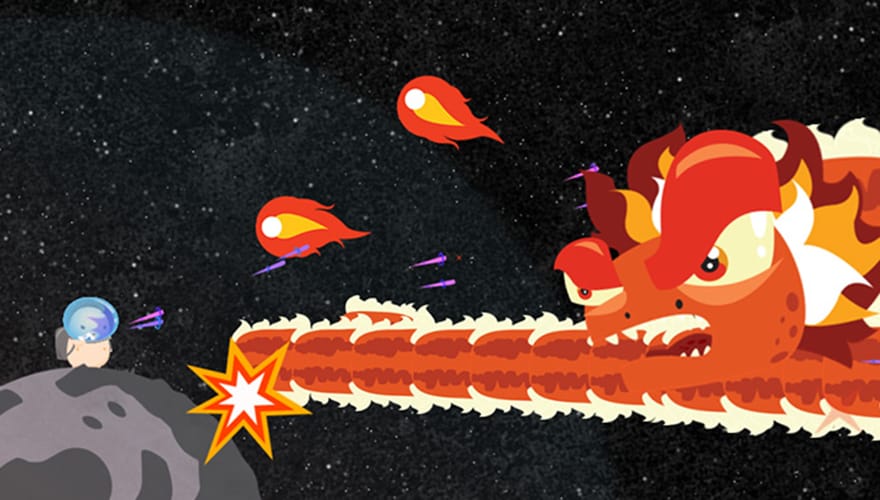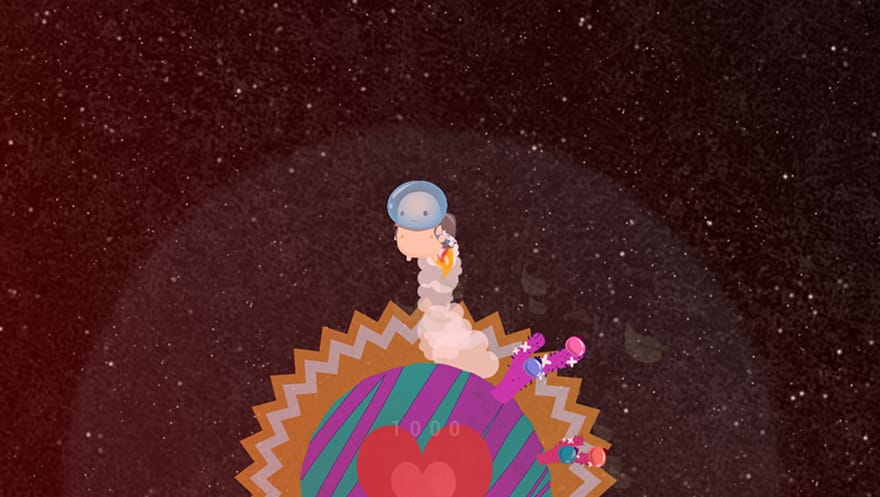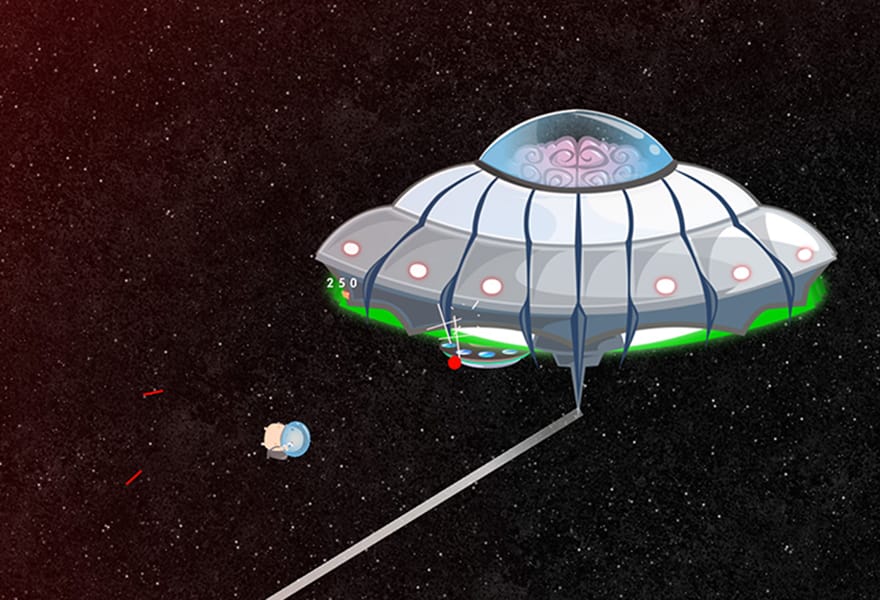The unimpeachable optimism of Cosmochoria

Optimism, genuine optimism, isn’t a sentiment you find in many games these days. Instead, most games feed in to our feelings of anxiety or despair. We play as the scruffy white male protagonist who may try to maintain reluctant optimism in the face of great odds, or who is coaxed into momentary optimism by an NPC who is trying to break through his tough manly exterior, but in both scenarios this kind of false optimism is no more than a cheap plot device that leads us closer to assured narrative success. We save the world, we rescue the damsel, we right the wrongs, and we dispense justice.
But too often, our quest is portrayed as a burdensome one, one the protagonist didn’t want or ask for but must shoulder all the same, and one which through completion devastates the environment around him. We have become used to games in which our victories, on some level, feel hollow.
We have become used to games in which our victories, on some level, feel hollow.
This isn’t the case in Cosmochoria. Instead, Cosmochoria, which is still in beta development, is a game anchored in optimism despite the assurance that the protagonist will inevitably fail his mission. You begin the game on a dead planet, naked but for the oxygen mask on your head and the jetpack on your back, equipped only with a weak gun and a single seed. Your mission is simple: you must plant the seed, nurture it to health, cultivate the seeds it bears, and continue this process repeatedly as you slowly bring the dead planet back to life. You must do this, of course, while fighting off the aliens who attack the planet, intent on its and your extinction. If you manage to bring the planet back to life, you must float through the universe in search of another dead planet to restore to health, and there, you will continue to fight alongside the planet for survival. There is no way to win the game; there is no end of planets to cultivate or of the enemies intent on destroying the universe. You are going to die, somewhere out in the cosmos, your mission to restore the universe cut short.
Yet, in lieu of inevitable failure, the game perpetuates optimism in players. You leave the game feeling good about yourself and as if your efforts, however doomed, were worthwhile simply for having nurtured and added life to the universe. How is this possible? The answer, perhaps, lies in game developer Nate Schmold’s approach to game design and community involvement.

For Schmold, design and community have become interlocking elements. The more he interacts with the community, the more obvious it becomes that the philosophy of the game is also the philosophy of his life. If Schmold is the lone cosmonaut of Cosmochoria, the game community is both the forest he wants to help grow, and the forest that gives him oxygen. Rather than keeping players at arm’s length by only inviting them into the game world, Schmold treats the relationship between developer and game as symbiotic, and potentially beneficial for all. For Schmold this means inviting players not only into his game’s world, but into his world and the creation process itself.
A quick review of Schmold’s Kickstarter page and his updates section reveal an important rhetorical difference between his methods for interacting with backers, and the way other indie developers interact with theirs. In his updates to backers, Schmold uses informal and familiar terms such as “pals” or “dudes,” while other games like Star Citizen refer to backers as “citizens.” While Star Citizen’s approach is obviously to immerse backers into the game world they are creating, and to build up the ethos of the game, Schmold’s approach is focused on treating backers as an important community that he trusts and values.
Schmold’s approach is focused on treating backers as an important community that he trusts and values.
The communal sharing of ideas amongst artists and their audiences obviously isn’t new. Serialized novelists have embraced audience feedback for decades, allowing readers to influence future storylines and outcomes. More recently, musicians such as Amanda Palmer and Beck have actively engaged audiences in their music’s creations: Palmer by crowdsourcing lyrics on Twitter and Beck by releasing his album Beck Hansen’s Song Reader in the form of sheetmusic audiences would have to record in order to hear. Videogame developers have also long used alpha and beta tests to gather feedback, but these feedback systems remain largely impersonal and focused on smoothing out details, rather than on aiding in the game’s creation. Schmold’s approach to his game’s audience, despite offering both an alpha and beta game to players, is different. Schmold treats the gaming community as a group of friends he’d happily invite into his living room, and that’s more or less what’s ended up happening.
During the last night of the Kickstarter campaign, Schmold took to Twitch to give the game, which had already been funded, one last stretch goal push. For 12 hours, Schmold opened up and bonded with the community, and when he was nervous about simultaneously conducting an AMA on Reddit, it was the community he turned to. “They all cheered when I hit the Post button and it was this big moment where I felt like I was best friends with a handful of people and I didn’t even know what they looked like,” he said. The thrill of sharing his own excitement with his supporters was obviously contagious: Schmold decided to host a weekly 2-hour broadcast on Twitch, and people continue to log in to join him.

Schmold broadcasts these Twitch sessions right from his home. While developers have traditionally cloistered their creative projects, protecting their creative vision, Schmold invites real-time suggestion, advice, and criticism for the game during the twitch sessions. We’ve seen this before in Kickstarter campaigns but Schmold feels emblematic of the trend. During the third broadcast, Schmold spoke to participants about his recent decision to add atmosphere to planets once they’d successfully been brought back to life. One participant suggested the inclusion of weather, and Schmold and the participants briefly discussed the possibility, eventually concluding as a group that while the addition of weather would be aesthetically interesting, that the game’s primary focus should currently remain on “optimization and efficiency.”
In these sessions, the participants are clearly treated as stakeholders whose opinions carry weight, and Schmold mediates these collaborations sessions as both creator and public relations manager. Just as he uses familial terms on his Kickstarter page, Schmold uses them in the live session too, referring to viewers as “pals,” “friends,” or on one occasion when he gave out the code to access the games dev mode, the participants became “family.” Listening to and including participants in the creative process doesn’t means always accepting their advice: During the first 2-hour broadcast, Schmold collaborated on a pet turtle for the game with a viewer, but by the third 2-hour session realized he’d need to make some design changes for the turtle to work in-game. While the viewer was present during both sessions and wished for the turtle not to change, Schmold remained steadfast. (As a consolation prize, Schmold gave followers a high resolution wallpaper featuring the pets he’s developed so far.)

When I asked Schmold to describe what his Twitch sessions feel like on his side of the camera he said, “You know that feeling when you’re driving home from the best day ever and its somber and everyone in the car is exhausted and the moon is extra bright … it feels like that.” Anyone who has helped Schmold work on the game probably does know that feeling because Schmold wants his audience to feel like they are in the car with him.
It’d be easy to dismiss Schmold’s relaxed attitude as lack of experience, or potentially problematic. The mob, after all, convinced Bioware to change Mass Effect’s ending; Tim Schafer has said that the mob’s expectations handcuffed him somewhat in Broken Age. But if you maintain the same optimism that Schmold himself does, it’s worth considering the possibility that he’s onto something. He has created and begun to foster a trusting and reciprocal relationship with the community in which he gets a willing creative sounding board on which to bounce and apply ideas to the game in real-time. Participants, on the other hand, get to feel directly involved in the creative process and to feel like they matter. Just as the cute and optimistic naked cosmonaut in Cosmochoria cares enough to nurture every seed to sprout and grow, Nate Schmold cares enough to plant seeds of positivity and inclusivity amidst a community that is too frequently subjected to negativity and exclusivity. What’s more, the quest isn’t a burdensome one to Schmold; it’s a quest he willingly shoulders in order to leave the gaming universe better, healthier, and more full of life than he found it.
Nate Schmold cares enough to plant seeds of positivity and inclusivity amidst a community that is too frequently subjected to negativity and exclusivity.
The truth Schmold has stumbled upon is one that has perhaps been hiding in plain sight all along: games require players to participate, and thus people who play games are predisposed to be participatory. Players want to be included and to actively participate, not just in game play itself, but also in the creative processes that lead to its final development. What Schmold, and other developers like him are realizing, is that including participants and would-be-players earlier on in the game creation process, and interacting with them on a personal level in which their ideas are heard and privileged in real time, might be the new normal for game development. By nurturing the game community early on, and by watering the seeds of open collaboration, perhaps games will cease to be hollow and depressing experiences and instead begin to grow into what we’d all like them to become.



